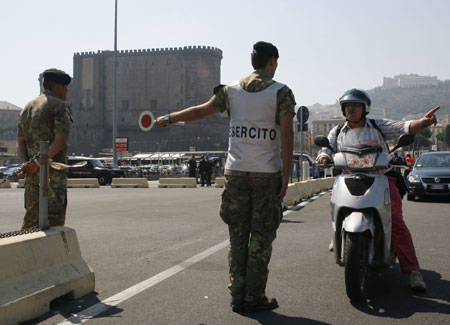Italy Using Soldiers to Fight Crime. Could It Really Work?
Italian Prime Minister Silvio Berlusconi won the April elections by pledging to make the country safer. After three months in office, he has offered the most visible initiative to his law-and-order campaign: his government decided to employ 3,000 troops in major Italian cities to patrol the streets and to help police reinforce security. Italian Minister of the Interior Roberto Maroni and Defense Minister Ignazio La Russa explained that the six-month initiative, which began last Monday, August 4, will have the Army, Air Force, Navy, and Carabinieri working alongside local police. A total of 2,000 troops were placed at the disposal of 16 mayors to guard black spots and immigration holding centers in cities such as Rome, Milan, and Naples. Some units are watching “sensitive” sites in Rome, Milan, and Naples—51 in the capital, 20 in Milan, and one in Naples. The remaining 1,000 are patrolling the streets of Bari, Catania, Milan, Naples, Padua, Palermo, Rome, Turin, and Verona. In Rome as well as in the northern city of Turin on the first day of the initiative, at least four people were arrested on petty crime and drug trafficking charges. An additional 50 people have been identified by authorities in Turin. Interior Minister Roberto Maroni said, “I believe we are on the right track to guarantee more safety for citizens, to give them the feeling that the government is there and it is serious about fighting crime.”
Such a controversial decision stirred up the usual debate between the center-right government and the center-left opposition. Defense Minister Ignazio La Russa told the press that residents shouldn’t be afraid but that “thieves, rapists, and criminals” should worry. Antonio di Pietro, the leader of the Italy of Values Party, complained that the troops are being “reduced to the role of extras in Cinecittà”, the legendary Rome film studio. Some critics said that the deployment of 3,000 troops would do little, if anything, to reduce crime. Others condemned it as a superfluous measure that could prove counterproductive. “Putting troops on the street sends a dramatic message that the situation is more serious than it is in reality,” said Marco Minniti, the shadow interior minister of the center-left Democratic Party, the largest opposition party. Achille Serra, a former Rome prefect with a long background in law enforcement, called the deployment “useless and ineffective”. He is now a center-left opposition senator. “I’ll remind you that we are not in Beirut and I’m wondering what a soldier will do to address a burglary or mugging,” he said in a newspaper interview. Defense Minister Ignazio La Russa said the presence of the armed forces was enough in itself to discourage criminals. “Citizens know the mere fact that the armed forces are on the streets… is in itself a deterrent. This is not a militarization of cities but a clear response to the perceived demand for greater security,” he said.
Inevitably, this decision stirred discussion not only in Parliament but also among Italian citizens. I have decided to walk the sunny, summery streets of Rome and hear the mixed reactions across the city during the first days of this new initiative. The first day in front of the subway station in the working-class neighborhood of Rebbibia, people seem to think that that the government’s decision was a positive one. “I feel better, it is reassuring that there is someone around that you can trust and that knows how to help you,” said Alina, 29, a Romanian who works as a family caretaker. Alina uses the subway to go to work and worries about her safety while returning home. “Now that I look around and see the soldiers,” she adds, “I automatically feel safer.” Francesco, age 25, works as a shop assistant in downtown Rome. He said, “I am happy; I hope this will solve things and eliminate part of the crime.” I asked Alessandro, age 35, a Sardinian Grenadier and one of the soldiers on duty at this subway stop, what he thinks of this initiative. He replied, “We are here to guarantee safety. Of course, after 13 years of missions abroad in Kosovo, Afghanistan, and Iraq, this seems easy to me. Residents are reacting enthusiastically; someone even offered to buy me a cappuccino and a croissant early this morning and there is a group of old women living near here that asks us every hour if we need a sandwich or a soda. It is a pleasant, homely atmosphere!”
Claudia, a twenty-two year old student, has mixed feelings, “It would have been better to act against crime before this point; to avoid having to deploy troops, it is an exaggeration. What is important now is that they aren’t leaving us alone again, like before.” Her boyfriend, Simone, also a twenty-two year old student, expresses his fears, “The image of soldiers in the streets may appear intimidating not only to people living here in Rome but also to tourists.” Perhaps he is unaware of the decision of Roman authorities not to send soldiers into the historic areas. Gianni Alemanno, the new mayor of the Eternal City, had complained that gun-toting soldiers could scare off tourists and asked that they not be sent into tourist areas. The government complied with his request.
The Romans seem to be getting used to seeing the troops in the streets. During a walk in the middle-class area of Via Nomentana, where there are embassies regularly patrolled by police, I met Laura, age 68, who is retired from work and who walks her dog through this neighborhood. “The soldiers make us feel safer but it is a sad fact that we have to use them,” she says, “Not to mention the risk that they could make it seem like things are worse than what they really are.”
Matteo, age 20, a student who is waiting for the bus, is extremely critical of the government’s measure:
“It could be a boomerang, it could hurt the country’s image abroad and even scare tourists away. Was it so necessary?”
This is the same question that was posed by the Italian media after the government’s decision. Doubts arose because of data from a new study recently released by the Censis research center that shows, for example, that Italy has the lowest murder rate of the biggest European countries and it is falling. One union leader suggested that the military should be drafted, instead, into Italian building sites to combat a growing cause of death among Italians—fatal accidents at work, which Italy leads in across Europe, according to Censis.
After the first six months, all doubts could be resolved once it is seen if the measure is effective or not.
(Edited by Stephanie Longo)





































i-Italy
Facebook
Google+
This work may not be reproduced, in whole or in part, without prior written permission.
Questo lavoro non può essere riprodotto, in tutto o in parte, senza permesso scritto.